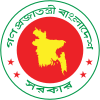District councils of Bangladesh
| This article is part of a series on the |
| Politics of Bangladesh |
|---|
 |
|
|
|
|
District Council or Zila parishad, or zilla parishad is a local government body at the district level in Bangladesh.[1] The Bengali word parishad means council and zila parishad translates to district council.
History
The 1988 Local Government (Zila Parishad) Act provided for Zila Parishads constituted with a mixture of representative members and appointed members.[1] Half of the members of Zila Parishad were elected (the Members of Parliament for the district and the chairman of Union Parishads and town Committees in the district). The government appointed the remaining half.[2]
Constitution
The Constitution of Bangladesh states that local government bodies will consist of elected representatives[3] but this has rarely been the case in history.[2]
Administrative structure
The Deputy commissioner (popularly abbreviated to "DC") of the District became the ex officio chairman of the District council.[4] He is appointed by the government from a Deputy secretary of B.C.S. Administration Cadre. He is also called District magistrate.
Functions
The functions of the District Council include construction and maintenance of roads, and bridges, building hospitals and dispensaries, schools and educational institutions, health facilities and sanitation, tube wells for drinking water, rest houses, and coordination of activities of the Union Parishads within the District.
Sources of Income
In addition to a grant from the government, District Councils are empowered to have a fund based on taxes, rates, fees, tolls, cess, etc.
References
- ^ a b Siddiqui, Kamal (2012). "Local Government". In Islam, Sirajul; Jamal, Ahmed A. (eds.). Banglapedia: National Encyclopedia of Bangladesh (Second ed.). Asiatic Society of Bangladesh.
- ^ a b M Abdul Latif Mondal (6 April 2011). "Non-elected Zila Parishad?". The Daily Star.
- ^ "Constitution of Bangladesh – Chapter III: Local Government". Archived from the original on 11 January 2012.
- ^ http://www.mopa.gov.bd/en/home/content/1/3/16




